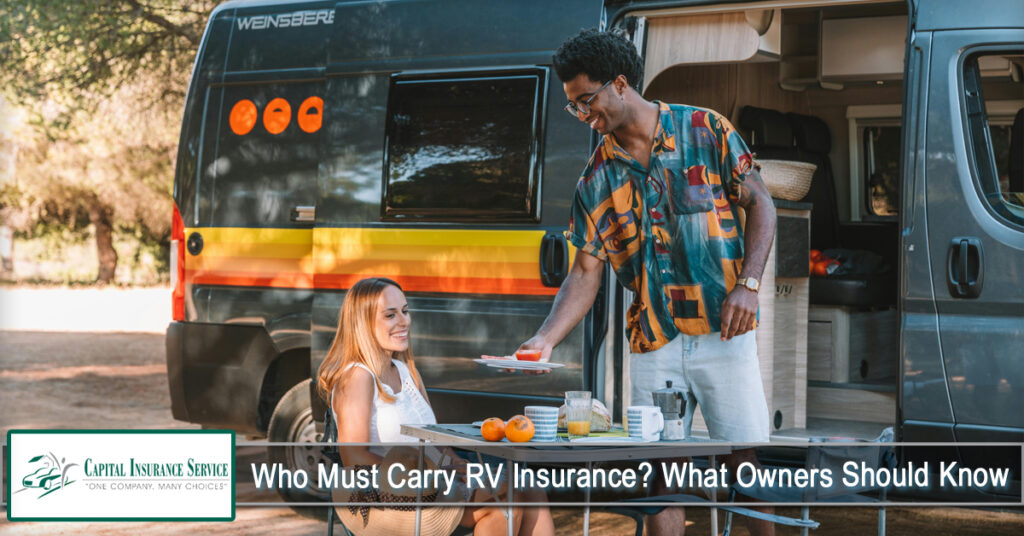
Recreational vehicles (RVs) offer the freedom to explore the open road while enjoying the comforts of home. But along with that freedom comes responsibility—and one of the biggest questions for RV owners is: Do I need RV insurance?
The answer depends on the type of RV you own, how you use it, and state requirements. Let’s break it down.
When RV Insurance Is Required
1. Motorized RVs (Class A, B, and C)
- If your RV is self-powered and driven like a car or truck, insurance is required in nearly every state.
- This includes liability coverage for bodily injury and property damage.
2. Financed or Leased RVs
- Lenders and leasing companies typically require comprehensive and collision coverage to protect their investment until it’s fully paid off.
3. State Minimums
- Every state has its own auto insurance requirements. Because motorhomes are vehicles, these rules apply.
Coverage often includes:
- Bodily injury liability (for injuries caused in an accident).
- Property damage liability (for damage to another person’s property).
When RV Insurance May Be Optional
1. Towable RVs (Trailers, Fifth-Wheels, Pop-Ups)
- Since these aren’t motorized, liability coverage usually extends from the towing vehicle’s auto insurance.
- However, this doesn’t cover damage to the trailer itself. Many owners buy additional RV coverage for protection.
2. Stored RVs
- If your RV is in storage and not being driven, you may not need full coverage.
- A storage or comprehensive-only policy can protect it against theft, fire, or vandalism.
Key RV Insurance Coverages to Consider
- Liability Coverage – Required by law for motorized RVs; protects against injury or property damage you cause.
- Collision Coverage – Pays for RV repairs after an accident, regardless of fault.
- Comprehensive Coverage – Covers theft, vandalism, fire, or weather-related damage.
- Uninsured/Underinsured Motorist – Protects you if hit by someone without adequate insurance.
- Personal Property Coverage – Reimburses you for belongings inside the RV (e.g., electronics, clothing, camping gear).
- Vacation Liability – Provides coverage if someone is injured at your campsite or inside your parked RV.
- Roadside Assistance – Covers towing and emergency help, essential for large vehicles like RVs.
Why Having RV Insurance Matters
- Protects Your Investment: RVs are expensive, and repair costs can be high.
- Covers Liability Risks: Accidents involving large vehicles often lead to significant damages and medical expenses.
- Provides Peace of Mind: Whether traveling full-time or seasonally, insurance ensures financial protection on the road.
- May Be Legally Required: Driving without insurance where mandated can result in fines, license suspension, or impoundment.
Conclusion
If you own a motorized RV, insurance is mandatory. If you have a towable trailer or fifth-wheel, coverage may not be legally required but is highly recommended to protect your investment. Ultimately, RV insurance ensures both compliance with the law and protection against the unexpected.
The takeaway: Don’t hit the road without knowing your coverage requirements—having the right RV insurance keeps your adventures safe, secure, and worry-free.
At Capital Insurance Service, we are committed to offering our clients a wide range of comprehensive and affordable insurance policies. We go above and beyond to ensure that we meet your unique needs with tailored solutions. To find out more about how we can assist you, please reach out to our agency at 775-301-9099 or CLICK HERE to request a free, no-obligation quote.
Disclaimer: The content provided in this blog is for informational purposes only and should not be considered professional advice. For personalized guidance, it is important to consult with a qualified insurance agent or professional. They can offer expert advice tailored to your individual situation and help you make well-informed decisions about your insurance coverage.

